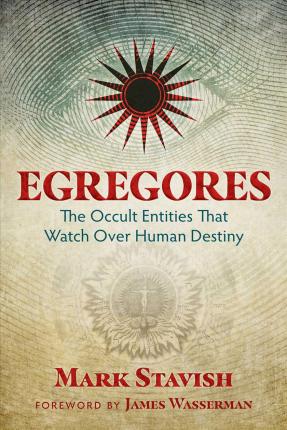In Mark Stavish’s new book, Egregores, we delve into a topic that frankly many people avoid. He believes that those who passionately lash out against these pervasive entities may be even more susceptible to their influences. You don’t have to be involved in the occult to be touched by them. In this article, I’m sharing thoughts about how we are in some way feeding into them, in our everyday life.
As a student of religious and esoteric studies, this topic fascinates me. How do we live conscientiously our most authentic life led by our convictions? Honest. Present. First, it’s important to be aware of egregores because you know, ignorance is not bliss. That’s especially true today with our mass media, and bombardment of information, ideas, and influences at a phenomenal speed and reach. Often, with a hidden agenda. To be sovereign and to experience personal liberation, we first must be aware. That’s what enlightenment is, bringing light to what is hidden, what we put in the shadows.
Now, egregores, like I mentioned earlier, are not just occult. They can be political, national, religious – we’ll see how later – they can also be negative or positive, to enslave or to uplift. Some people do believe they are all negative, at least on this level of existence. In any case, they are a group consciousness that exists beyond our material plane. That’s right. Through them, we could be hooked into the invisible world, in ways we may not fully understand. The battle of good and evil…However, on the grandest, oneness level, all has purpose, all works for our return to Source. So…you decide.
First off, this is not to scare any of you. If you have been on the spiritual journey at all, you would have already come across the term “entities”. Maybe you’ve even experienced entity attachment. The word “entity” means different things to different people, in different schools of thought. Hey, a corporation is a legal entity. So you get the idea. From a Muslim energy teacher, I learned that entities are just like you and me, living in a city/town, with families, and jobs to do. That, for me, was a new perspective. Generally we take it to mean a non-material being.
What is an Egregore?
According to Mark Stavish, the word has Greek origins, coming from what means “wakeful” or “watcher”. This is how the Book of Enoch describes an angelic being. The two definitions he included are : “(occult) autonomous psychic entity composed of and influencing the thoughts of a group of people” and “the home or conduit for a specific intelligence of a nonhuman nature connecting the invisible dimensions with the material world in which we live.” The second, and older definition, he continues to write, is the “true source of the power of the ancient cults and their religious-magical practices.”
An entity can be a religion, organization, nation… and an egregore is the totality of the material, mental, astral, and celestial energies. Let’s remember that a physical action does not exist in isolation from other planes. And our thoughts themselves are not just mental energies. Strong enough, a thought can become an independent thought form.
If you read mythology, you’ve come across a city or a nation’s egregore. Many places were/are protected by deities, for example. The egregore that watches over a city or a nation, like all egregores, is boosted by human admiration, dedication, worship, rituals, and offerings.
Here are a few ideas to mull over:
- an egregore is formed whenever two or more people come together in common thought, belief, and perception of necessity.
- acts of devotion, association, and ritual feed egregore which exists in the material, astral, and celestial realms.
- it is not always clear to initiates or general members the actual intentions of forming and perpetuating a specific egregore.
- egregores can be dispersed, without continual energetic boosting; though many can be revived.
- while it is possible to direct them to beneficial effect, we must ask to whose benefit? What is beneficial to one person or group of people may be detrimental to another.
Mark Stavish devotes a large portion of his book Egregores to the definition, history, and wide-ranging examples, including modern ones. It is in the last chapter that he shares ways to remove oneself from their influences.
How is this relevant to most people?
His most stand-out statement is for us to be clear about why we are affiliating with groups in the first place. What needs are we looking to be met? What are our expectations? We are not only talking about occult, esoteric, religious or political groups. He gave examples of a street gang, an artists’ circle, and Parent Teacher Association. Perhaps you’ve seen the movie Bad Moms.
As he pointed out, some people may join organizations because they believe group think is more trustworthy than their own. The old saying “safety in numbers” comes to mind. Hmm. Some people may be lost or afraid of making wrong choices. Or at least being told their choices are wrong. It takes strength, called from the depths of your being, to stand up for who you are. And perhaps something more to be who you are, without needing to defend that or making others wrong.
Any time we are passionate, to the exclusion of others’ opinions and especially their well-being, we must pause and question our motivations and the origins of this passion. What are we really after? Are we covering or ignoring a deep fear? Why are we so angry at other people? What’s this process of othering “people not like me”? In today’s world, it’s easy to find such examples. We have many polarizing issues that have been further mobilized by vested interests and the old guard to strengthen division.
Egregores : The Occult Entities That Watch Over Human Destiny
Presenting the first book devoted to the study of egregores, Mark Stavish examines the history of egregores from ancient times to present day, with detailed and documented examples, and explores how they are created, sustained, directed, and destroyed. Stavish provides instructions on how to identify egregores, free yourself from a parasitic and destructive collective entity, and destroy an egregore, should the need arise. Revealing how egregores form the foundation of nearly all human interactions, the author shows how egregores have moved into popular culture and media–underscoring the importance of intense selectivity in the information we accept and the ways we perceive the world and our place in it.
(description from BookDepository – affiliate link)
Being Free
The book Egregore offers a number of ways to free oneself from their influences. Here are three examples:
- disengage from the group or organization. This may be challenging if it’s a nation or perhaps it is where you have belonged to since childhood or your whole family is involved. It’s important to address your fears around leaving and how your needs for belonging outweigh being true to yourself.
- “therapeutic blasphemy” or conscious desacralization. Described in The Priceless Jewel by Buddhist teacher Sangharakshita as “transforming his unconscious resistance to, and reaction against, Christianity into an integral part of his conscious attitude.” In this way, a person can observe any unhealthy patterns created by teachings of the group. It’s not only cults that restrain and forbid group members from having certain beliefs. Sometimes this control mechanism is more subtle. Whenever we strengthen our identity through the “other” it’s time to take pause. In continuing to examine our beliefs, we come to clarity them, which strengthens our understanding.
- deprogramming & taking back the narrative – this is reclaiming our sovereignty by reorienting our goals and life direction. Such a monumental task requires addressing the identity we have taken on, our belief systems, emotional investment, shared values, for example. The writer suggests placing all associated items in a box out of sight for a minimum of one month. In that time, observe how you feel, what thoughts surface, and what happens when you focus on new possibilities. Taking back the narrative means finding your true story, rising above any limitations and restrictions the group had previously imposed.
In our modern mass media age, it is also essential not to be distracted. I think we’ve come to mistrust news in general and yet, far often we don’t realize how much research, studies, stories, and narratives are framed for specific ends. So before jumping full on into a twitter war or joining FB groups, taking on “anti-” or “pro” stances, understand the workings of egregores and how our very action, our righteousness, our passionate viewpoint may well be feeding into an agenda we may not be onside for.
Rather than mindlessly clicking on ads or cute videos, to fill time or to appease the twinges of boredom, stay focused. Be mindful. If you do click on those ads and cute puppy videos (I know I do), know why you are doing it. If you choose to join a group, know why you want to and have no illusions about your needs. Be brave, and own up to what you need. Fear, shame, and guilt are easy avenues through which others can override your knowing.
Perhaps this book isn’t your cup of tea. Or the topic of entities is something you want to swerve away from. I get that energy flows where attention goes. There is also something to be said about being aware and more conscious of what we are really supporting and feeding in our everyday life.


